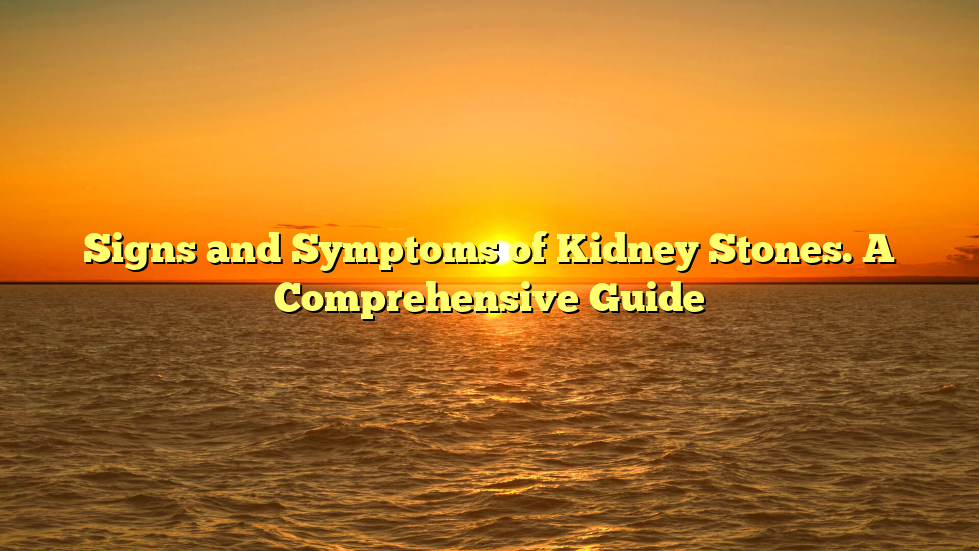Kidney stones are a common medical condition that affects millions of people worldwide. These small, hard mineral deposits can form in the kidneys and cause a range of uncomfortable symptoms. Recognizing the signs of kidney stones is crucial for timely diagnosis and treatment. In this comprehensive guide, we will explore the various signs and symptoms of kidney stones, helping you better understand and identify this condition.
See More Chicken Coop Sign
1. An Overview of Kidney Stones
Before diving into the signs and symptoms of kidney stones, it’s important to have a basic understanding of what they are. Kidney stones are solid masses that develop from chemicals in the urine. They can vary in size and shape, ranging from as small as a grain of sand to as large as a golf ball. Kidney stones can be made up of different substances, including calcium oxalate, uric acid, and struvite.
2. Common Signs and Symptoms
2.1 Flank Pain
One of the hallmark signs of kidney stones is flank pain. This refers to severe pain that originates in the back or side, usually below the ribs. The pain can be sharp and intense, often described as writhing or stabbing. Flank pain typically occurs when a kidney stone moves through the urinary tract, obstructing the flow of urine.
See more Product at Memorial Sign World
2.2 Hematuria
Hematuria, or blood in the urine, is another common symptom of kidney stones. The presence of blood gives the urine a pink, red, or brownish color. It is important to note that not all cases of hematuria are caused by kidney stones, but it is a significant indicator when combined with other symptoms.
2.3 Frequent Urination
People with kidney stones often experience an increased frequency of urination. This is because the stone irritates the lining of the urinary tract, causing a frequent urge to urinate. However, despite the urge, only small amounts of urine may be passed due to obstruction by the stone.
See More Memorial Sign World Articles:
- Sign Closed for Memorial Day. Honoring our Fallen Heroes
- Signs and Symptoms of Gallbladder Stones. What You Need to Know
2.4 Painful Urination
In addition to frequent urination, kidney stones can also cause pain during urination. This discomfort is often described as a burning sensation or a sharp, stinging pain. The pain may be felt in the lower abdomen or in the urethra, the tube that carries urine from the bladder out of the body.
2.5 Nausea and Vomiting
Kidney stones can trigger feelings of nausea and vomiting due to the intense pain experienced. The pain signals sent to the brain can disrupt the normal digestive process, leading to these symptoms. Nausea and vomiting may also be associated with dehydration caused by reduced fluid intake due to pain.
2.6 Fever and Chills
In some cases, kidney stones can lead to an infection in the urinary tract, resulting in fever and chills. This is more commonly observed with larger stones or when there is a blockage that prevents normal urine flow. If you experience fever and chills along with other symptoms of kidney stones, it is essential to seek medical attention promptly.
3. Less Common Signs
3.1 Foul-smelling Urine
While not as common as other symptoms, foul-smelling urine can sometimes occur with kidney stones. This odor may be caused by an infection associated with the stones or due to the presence of certain chemicals in the urine.
3.2 Cloudy or Murky Urine
Kidney stones can cause urine to appear cloudy or murky. This is often indicative of an increased concentration of minerals and substances in the urine due to reduced fluid intake or impaired kidney function caused by the stone.
3.3 Groin Pain
In some cases, kidney stones can cause referred pain to the groin area. This pain may radiate from the lower back or abdomen down to the groin region. It is important to note that groin pain alone may not be attributed solely to kidney stones and should be evaluated by a healthcare professional.
4. When to Seek Medical Attention
While kidney stones can often pass on their own with proper hydration and pain management, there are instances where immediate medical attention is necessary. It is crucial to be aware of these circumstances to ensure timely intervention:
- Severe or worsening pain that cannot be managed with over-the-counter pain relievers.
- Persistent fever and chills, which may indicate an infection.
- Inability to urinate despite feeling the need to do so.
- Blood in the urine that persists for more than 48 hours.
- Vomiting accompanied by severe pain and dehydration.
5. Conclusion
Recognizing the signs and symptoms of kidney stones is vital for early detection and appropriate treatment. If you experience any of the aforementioned symptoms, it is important to consult a healthcare professional for an accurate diagnosis and personalized management plan. Prompt medical attention can help alleviate discomfort and prevent potential complications associated with kidney stones.
Remember, prevention is key when it comes to kidney stones. Maintaining proper hydration, following a balanced diet, and managing underlying medical conditions can significantly reduce the risk of developing kidney stones.
#memorialsignworld, #memorialsignworldstore,#MetalMonogramSigns, #PetMemorialCanvas, #ChickenCoopSign/

